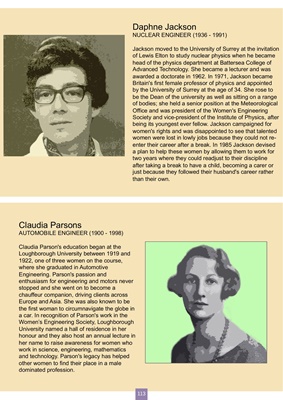
Daphne Jackson
NUCLEAR ENGINEER (1936 - 1991)
Jackson moved to the University of Surrey at the invitation
of Lewis Elton to study nuclear physics when he became
head of the physics department at Battersea College of
Advanced Technology. She became a lecturer and was
awarded a doctorate in 1962. In 1971, Jackson became
Britain's first female professor of physics and appointed
by the University of Surrey at the age of 34. She rose to
be the Dean of the university as well as sitting on a range
of bodies; she held a senior position at the Meteorological
Office and was president of the Women's Engineering
Society and vice-president of the Institute of Physics, after
being its youngest ever fellow. Jackson campaigned for
women's rights and was disappointed to see that talented
women were lost in lowly jobs because they could not reenter
their career after a break. In 1985 Jackson devised
a plan to help these women by allowing them to work for
two years where they could readjust to their discipline
after taking a break to have a child, becoming a carer or
just because they followed their husband's career rather
than their own.
Claudia Parsons
AUTOMOBILE ENGINEER (1900 - 1998)
Claudia Parson's education began at the
Loughborough University between 1919 and
1922, one of three women on the course,
where she graduated in Automotive
Engineering. Parson's passion and
enthusiasm for engineering and motors never
stopped and she went on to become a
chauffeur companion, driving clients across
Europe and Asia. She was also known to be
the first woman to circumnavigate the globe in
a car. In recognition of Parson's work in the
Women's Engineering Society, Loughborough
University named a hall of residence in her
honour and they also host an annual lecture in
her name to raise awareness for women who
work in science, engineering, mathematics
and technology. Parson's legacy has helped
other women to find their place in a male
dominated profession.
113